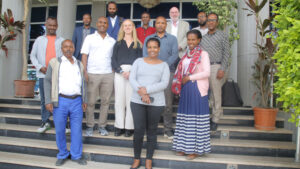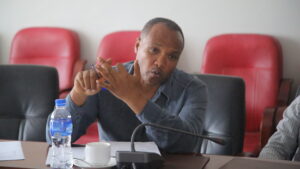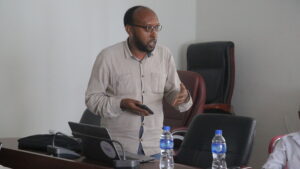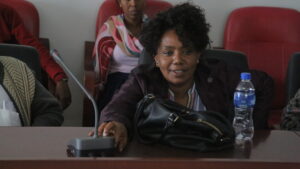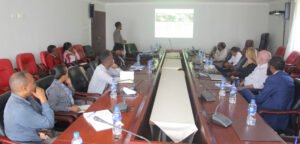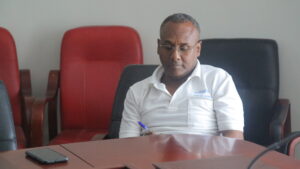The Government of Ethiopia and Finland bilateral project, Community-Led Accelerated Water, Sanitation and Hygiene Phase IV (COWASHIV) is one of the first projects actively engaging in Tigray post the conflict. The project was initially expected to be implemented two years ago but was suspended following the outbreak of hostilities in the Region. The project officially resumed working last June, and is now making significant progress in helping the people of Tigray rebuild their lives.
Last Wednesday (September 22, 2023), the COWASH IV federal technical assistance team went to Mekele City and held discussions with the regional support unit team. The two teams discussed on ways forward and how to deal with challenges to the project. The Tigray Regional Steering Committee also held its first meeting on Thursday (September 23, 2023) focusing on the 2016 Ethiopian fiscal year project plan.
The COWASH project is a story of hope showing how a community can come together to rebuild their lives and create a better future for themselves.
COWASH IV is a particularly important project for Tigray, which is still recovering from the war that erupted in 2020. The war damaged much of water supply systems and sanitation facilities constructed under the three previous phases of the project. As a result, currently many people in Tigray do not have access to safe water and sanitation.
Desalegn Kirose, Tigray COWASH IV Regional Support Unit (RSU) leader, said rehabilitating damaged water points is especially significant as many people in rural areas are traveling a long distance in search of water. Specially, traveling for women who face the risk of gender-based violence following the conflict has been highly difficult. So, according to Tater Hadis, Tigray Water and Energy Bureau COWASH Coordinator, the elderly have been responsible to travel to get water which has been difficult for them due to their age. To solve this problem, COWASH IV plans to rehabilitate damaged water supply points and latrines constructed under the project, and build new schemes in the 2016 Ethiopian fiscal year.
The resumption of the project itself has been seen as support for efforts to rebuild the region following the conflict, said Desalegn Kiros. The community has also highly appreciated the start of phase four, and is grateful for the project’s efforts to provide them with safe water and sanitation, said Desalegn.
The previous three phases of COWASH had made significant progress in Tigray.
Since 2011, 869 community water points, 40 water points in schools, and 7 water points in health centers were constructed, under the COWASH project, providing safe water supply to more than 137,480 people in 7 woredas of the region. Additionally, latrines were constructed in 25 schools and 9 health centers.
The COWASH IV project plans to provide water supply to 69,150 people in Tigray through both new water schemes and the rehabilitation of damaged water infrastructure. It also aims to carry out physical and human capacity building works.
CMP “an effective approach that must be followed by others.”
The Tigray RSU team, particularly, is appreciative of the project’s use of the Community Management project (CMP) approach. One of the things that makes COWASH unique is its focus on community capacity building. The project works with communities to identify their needs and priorities, and then provides them with the resources and training they need to implement their own solutions. This approach helps to ensure that facilities constructed under the project are sustainable and meet the specific needs of the community. Girmaye Tesfaye, Tigray COWASH IV Community managed project (CMP) Specialist, said COWASH has been very beneficial for people in Tigray as it firstly involves communities by recognizing their capacity and needs.
Desalegn fully agrees stating that COWASH has been very beneficial by recognizing communities’ capacity and needs s, providing community capacity building, and by getting community consent and support. He says that this makes it an “effective approach that must be followed by others.”
Girmaye, also said that the project’s focus on community capacity building is an effective and result-oriented approach. According to him, the fact that the community gets to learn and develop skills s in the process helps to maintain sustainability. Above all it creates an ownership feeling among the society. As a result, there is a huge interest for the COWASH project to continue in the region, said Girmaye.
COWASH IV is more than just a water, sanitation and hygiene project; it is also a community development project.
The COWASH project is also helping to create jobs and opportunities for local businesses through market-based sanitation and training and contracting local artisans for water point construction. For example, the project in its previous phases provided start up capitals and training for local business on how to produce and sell WASH related products including toilet slabs.
The fact that the project works with the five key bureaus, bureau of Water and Energy, Women Affairs, Education, Health and Finance makes it effective in providing sustainable and inclusive infrastructure. The previous phases of the project also laid a ground work for a strong network among project regions through knowledge and skill sharing forums.
Overall, the COWASH project is a valuable asset to the people of Tigray. The project’s focus on community capacity building, sustainability, and empowerment is essential for ensuring that development projects are effective and long-lasting.
